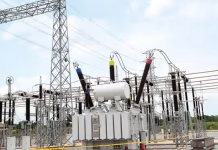The nation faces the spectre of darkness as Electricity Generating Companies (GENCOs) issue warnings that their plants may shut down soon.
Joy Ogaji, the Executive Secretary, Association of Power Generation Companies (APGC), who issued the warning yesterday, did not state when the shutdown of the power plants would begin.
She said: “The shutdown will happen automatically because the machines are already giving us the signal that they are about to shut down. It could happen this month. It could happen next month, or even tomorrow. Nobody knows exactly when.
“The machines have given us (GENCOs) notice. That is why we are giving the market that notice so that when it happens Nigerians will not say GENCOs are sabotaging the market.”
The GENCOs are blaming the imminent shutdown of the power generating plants on the inability of the Transmission Company of Nigeria (TCN) to fully take up and transmit the available volume of electricity generated into the national grid.
For instance, out of an average available electricity capacity of 7,485 megawatts (MW) generated on a daily basis by the GENCOs last April, Mrs Ogaji said, data published by the System Operator/National Control Centre showed the TCN could only transmit an average of 3985MW (about 46.8 percent) of the available capacity.
Although the country boasts of over 7,500 of available generation capacity, she said the national grid could hardly take more than 4500MW without rejecting excess load.
Operators said electricity generation above 5,000 MW would either be lost or rejected by DISCOs or TCN due to inadequate capacity, namely transmission line cuts, transformer faults, and high grid frequency.
Mrs Ogaji said the constant operation of the hydro and thermal power plants below their designed base loads would result in lower efficiency like all electrical appliances which have set conditions under which they function at optimal levels.
She said the constant under-utilisation of the capacity of the machines resulted in several damaging effects, including thermal stress on steam turbine blades and creep of compressor and turbine blades.
Other damage include cracks on exhaust sleeves, Irregular heating and cooling cycles of hot gas path components, cracks in ceramic tiles of the combustion chamber, and defective gas control valves due to wear and tear.
To save the power sector from collapse, Mrs Ogaji said the GENCOs had resolved that there was a need to shut down the power plants till when the electricity transmission and distribution networks would become efficient enough to take power and fully pay for both their outstanding and current liabilities.
She said the power to shut down the power plants till further notice was covered under Section 12.6.6 of the Grid code, which allows them to disconnect the power generating unit for reasons of safety of personnel, apparatus, and/or plant.
Mrs Ogaji said the TCN’s continued lower capacity utilisation by dispatching less than 50 percent of average available power generation to the national grid was forcing them to operate their turbines/machines at far below the base load settings.
The lower capacity utilisation by TCN, according to GENCOs, has resulted in an increase in consumption of gas by as much as 15-20 percent in cost not captured either by the Nigerian Bulk Electricity Trader (NBET) or its calculation of multi-year tariff order (MYTO).
Mrs Ogaji said the inability of TCN to utilise the GENCOs available capacity of 7500MW does not give them the incentive for further capacity recovery and expansion.
She said the GENCOs electricity generating plants could no longer sustain the growing operating costs alone, given the level of remittance in the market.
The power ministry is yet to react to the threat by the GENCOs.












